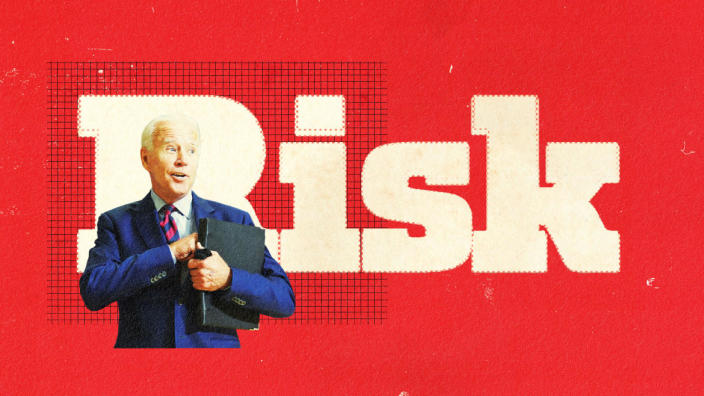
President Joe Biden has balked at supplying Ukraine with new weapons, including Army Tactical Missile Systems (ATACMS) and F-16 jets, just as he balked at supplying Ukraine with Patriot batteries , high mobility artillery rocket systems (HIMARS) and tanks.
In the Middle East, as the Islamic Republic of Iran increases its stockpile of enriched uranium in quality and mass, while stepping up its proxy attacks on U.S. forces, the administration remains paralyzed to respond with anything other than bribing the regime with $24 billion in cash – for which it is gradually giving Iran access.
Relations with China are also difficult. The last time there was such a standoff was in 2001, over an American spy plane captured by the Chinese, prompting an apology from the US government. The table has since turned. After a public outcry over a Chinese flying object with cutting-edge intelligence-gathering technology (or “the stupid balloon” as the president described it) in American airspace, the president shot down the software spy and the Chinese broke off relations in response.
Blinken and Xi take a step back from the US-China Cold War
Not speaking with a strong opponent is likely to cause misunderstandings, and the administration seems to be extremely uncomfortable about this. To restore the relationship, the administration has since issued an apology to the Chinese.
CIA Director Bill Burns, perhaps confused that he is still a professional diplomat rather than a spy chief, has secretly traveled to China to convince the adversary to resume normal relations. It came shortly after Jake Sullivan, the president’s aide for national security affairs, made the same attempt in Vienna during an interview with China’s foreign minister.
Joe Biden attends a working session on food and energy security during the G20 summit on November 15, 2022 in Indonesia.
” src=”https://s.yimg.com/ny/api/res/1.2/5eSFHPGlOZMj0sBOZa2zWA–/YXBwaWQ9aGlnaGxhbmRlcjt3PTcwNTtoPTQ2OQ–/https://media.zenfs.com/en/thedailybeast.com/8fc16960d12186d55817 70c67ee25efd” class= “caas-img”/>
Joe Biden attends a working session on food and energy security during the G20 summit on November 15, 2022 in Indonesia.
Leon Neal/Getty
Defense Secretary Lloyd Austin, too, has been begging for months for a call with his Chinese counterpart to resume contact between the two militaries, which the Chinese broke off after the balloon incident and a key part of peacekeeping. during the Cold War, so far in vain. In part, he seeks to implement a presidential initiative. At a G-20 meeting in Bali, Biden said he and Chinese Communist Party General Secretary Xi Jinping agreed they “should have an open hotline” to avoid misunderstandings. Except that the Chinese don’t pick up the phone.
Finally, on June 18, Secretary of State Antony Blinken visited Beijing and held brief talks with Xi and other officials. According to preliminary reports, the two sides agreed to “stabilize” relations, but the Chinese have not agreed to resume military diplomacy as long as the United States maintains its sanctions against Chinese entities. Now the risk-averse administration must choose to de-risk the relationship or de-sanctify it.
There are two types of risk reduction. The first is that the private sector is divesting from China, anticipating a deterioration in relations. Sanctions and tariffs in recent years ensured it was already underway, with companies anticipating that investing in China is no longer a safe bet. All good. The other is maintaining the status quo of relations — not the sour status quo, but the hot peace with China over the past decade — which seems to have been the focus of Blinken’s trip.
All of these efforts have sought to minimize the risk of conflict, which is also true of the administration’s treatment of Russia and Iran.
It is imperative to manage the risk of unnecessary conflict with China or any adversary, especially one that could escalate into war. But it should be considered that risk aversion is itself a risk.
The United States is the world hegemony. It is another way of saying that he is the judge, the jury and the executioner of the world.
Despite the cries of “too many problems at home” on both the left and the right, it should be needless to say (and sadly it is not) that by setting the rules of the world and enforcing them, Americans are the biggest beneficiary of its own investment.
But those benefits come with the burden of requiring guts.
COVID has proven that we are unprepared to handle China’s dictatorship
The only thing that stands between World War III, which will be far more catastrophic than the last, and us, is America’s commitment to say no when adversaries break the rules. It was a lack of commitment that caused the Second World War.
American treatment of Russia since Vladimir Putin’s accession to power has been little different from that which it reserved for Adolf Hitler. America has turned a blind eye to its undermining of weak Russian democracy, Russia’s minor and major incursions into neighboring territories, and the annexation of Crimea.
We rarely get a response to a history What if?, but we have ours now. What if the US and UK arm Czechoslovakia and tell it to stand up to the Nazis? Hitler would have looked as miserable as Putin does today.
British Prime Minister Rishi Sunak shakes hands with President Joe Biden of the United States of America during a bilateral meeting at the G20 summit in Indonesia.
” src=”https://s.yimg.com/ny/api/res/1.2/xTW1z.yp.GToZYyPswzHGw–/YXBwaWQ9aGlnaGxhbmRlcjt3PTcwNTtoPTQ3MA–/https://media.zenfs.com/en/thedailybeast.com/ 944b7433a5718f8f802a451841e386e7″ class=”caas-img”/>

